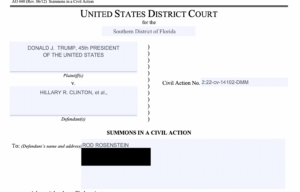[ad_1]

(Photo by Win McNamee/Getty Images)
How many times can you put a defendant’s address on the public docket before observers can reasonably conclude that it’s not an accident?
Asking for Donald Trump’s lawyers Alina Habba and Peter Ticktin, who added former Deputy Attorney General Rod Rosenstein to the long list of defendants in their LOLsuit against Hillary Clinton, her “loyalist” James Comey, and half of DC last week.
In April, Habba and Ticktin issued subpoenas for Comey, Andrew McCabe, Peter Strzok, Lisa Page, and Kevin Klinesmith, all former or current FBI employees, without redacting their home addresses. The US Attorney moved to redact the public record, and Trump’s lawyers agreed.
When they did it again, the government requested an order “precluding the filing of documents in the public record containing the addresses of the named former FBI employees and permitting the United States to substitute redacted copies of any such offending document filed in the public record without further motion or order from this Court.”
At which point Ticktin lost his shit, screeching that it was an insult to “the president” to suggest that he would deliberately seek to visit harm upon these people by sending a mob of his supporters to their houses.
“No one in their right mind would want to see harm befall any FBI agents, presently active, or retired, not only including the former President of the United States, but especially the former President,” Trump’s lawyers huffed.
As we observed at the time:
Which is true, if you disregard the fact that Trump sent dozens of tweets calling for Comey’s arrest, illegally fired McCabe to steal his pension, had his Justice Department leak Page and Strzok’s personal messages to reporters on the eve of their congressional testimony, and spent years exhorting his supporters into paroxysms of rage at the five of them, referring to Page and Strzok in the crudest, most vulgar terms.
Ticktin was positively furious that the government would imply that he needed a court order to be told how to appropriately file a document.
“The certainty is now there, that no such filings will be made, going forward,” he fumed, adding that “The President, through his undersigned attorney, though, does object to an order being filed, in that his attorney should be trusted to do whatever is necessary to protect sensitive information from being released, and one who is not a threat should not be enjoined in any way.”
Wait for it …
This is what the summons for Rod Rosenstein looked like last week. But without the black redaction bars.

Soon enough, Trump’s lawyers agreed to refile the document, admitting that “counsel for ROD ROSENSTEIN, has conversed with the undersigned, and explained that the disclosure of ROD ROSENSTEIN’s personal information could lead to the former Department of Justice employee being harassed, threatened, or otherwise having his safety jeopardized, as he has received death threats in the past.”
Which is perhaps predictable, since their client once defended retweeting an image of Rod Rosenstein behind bars by saying that “He should never have picked a special counsel.”

US District Judge Donald Middlebrook granted the motion to redact Rosenstein’s address, noting that “Since my first Order granting the United States’ Motion to Redact, Plaintiff has, for the third time, filed documents in the court record (namely, a summons) containing sensitive information.”
The court then filed its own order, sua sponte:
The record does not contain executed summonses for Defendants James Corney, Peter Strzok, and Lisa Page. As such, I am unable to determine whether those Defendants have been served and, if so, on what date. Plaintiff is therefore directed to file a Status Report on or before July 1, 2022 informing the Court of the status of those Defendants. If Plaintiff files any executed summonses as proof of service, he must redact Defendants’ addresses. [Emphasis original.]
Malice or incompetence? It’s the eternal question in Trumpland, right?
Trump v. Clinton [Docket via Court Listener]
Liz Dye lives in Baltimore where she writes about law and politics.
[ad_2]




